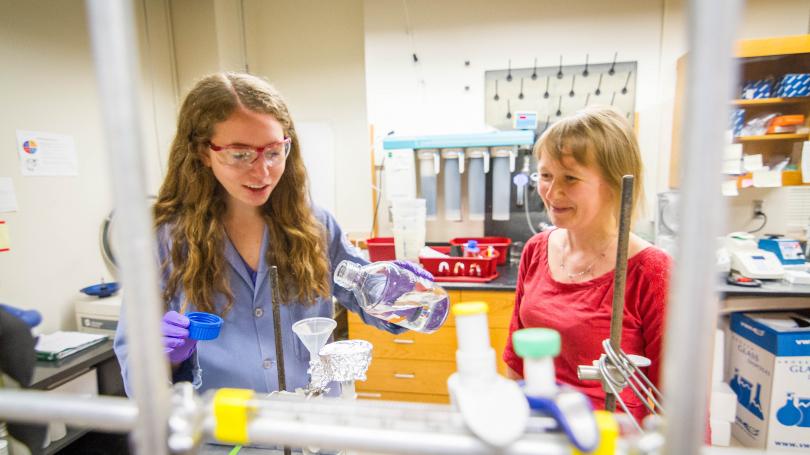
Stephanie Alden '16, left, completed her senior thesis in biological chemistry under the guidance of Associate Professor of Chemistry Ekaterina Pletneva, right. Photo by Josh Renaud '17, Web Services Student Content Corps.
Stephanie Alden '16 is no stranger to working in a scientific research laboratory.
As a high school student in Cleveland, Ohio, she worked at a pharmacology lab at Case Western Reserve University. Once she arrived at Dartmouth, through a first-year research internship with the Women in Science Project (WISP), Alden quickly found a home in a genetics lab studying Alzheimer's disease.
"WISP started my research career here," says Alden. Her first-year internship led to a Sophomore Science Scholarship working in another genetics lab and then to a James O. Freedman Presidential Scholarship in the bioinorganic chemistry lab of Ekaterina Pletneva, an associate professor of chemistry. Alden, a biological chemistry major, completed her senior thesis on cytochrome c, a heme protein that functions in respiration and also is a model system for other, more widely found enzymes involved in drug metabolism.
"Stephanie's thesis project had many challenging experiments that required troubleshooting and patience," says Pletneva. "I was impressed by her strong academic foundations, her hard work, independence, and resilience. Her drive and intellectual ownership of the project were of the kind one would expect from a top graduate student."
Alden's research experiences at Dartmouth have taught her persistence, problem-solving skills, and the rules of conduct in a professional lab setting. She recommends that incoming Dartmouth women interested in STEM fields get involved in WISP, either as an intern or as a mentee, and that they explore research and classes across the sciences during their first year. "I started a bit too narrowly focused on science courses and, if I had it to do again, probably would have broadened my focus a bit," Alden says. However, she advises students, "Once you do know what you want, you need to start getting serious about your major."
Alden says the networking and mentorship encouraged by WISP are its most valuable aspects. In particular, the mentorship program "gives the program more of a personal touch, and makes people feel more connected to WISP," she says. Alden cites her WISP mentor as a tremendous resource during her first year. "Even if we only met a couple times a term, it was nice to ask her any questions I had."
Alden was busy outside of the lab as well. She was a Wellness Peer, a WISP mentor, a Link Up mentor, and the editor-in-chief of the Dartmouth Undergraduate Journal of Science (DUJS). Through the DUJS, she started an outreach program that sends Dartmouth students to help Upper Valley schools with science-related extracurricular activities. Alden has tutored her peers in organic chemistry and was a teaching assistant for a cellular biology lab course. She was a Rufus Choate Scholar (in the top five percent of her class) since her first year and is a member of the Phi Beta Kappa honor society.
Alden will participate in a year-long program at the National Institutes of Health that will allow her to work for the National Cancer Institute as she applies to medical school.
The Women in Science Project was co-founded in 1990 by Carol Muller '77, former associate dean for administration at Dartmouth's Thayer School of Engineering, and the late Karen E. Wetterhahn, professor of chemistry and associate dean for the sciences. The program helps create an environment where women can thrive in science, technology, engineering, and mathematics. The program, which is celebrating its 25th anniversary this year, has received numerous accolades and is replicated on college campuses nationwide.
The Web Services Student Content Corps is an experiential learning program designed to give students professional work experience in digital content creation. Content Corps members work under the guidance of the Web Services team to produce content for department and program websites.